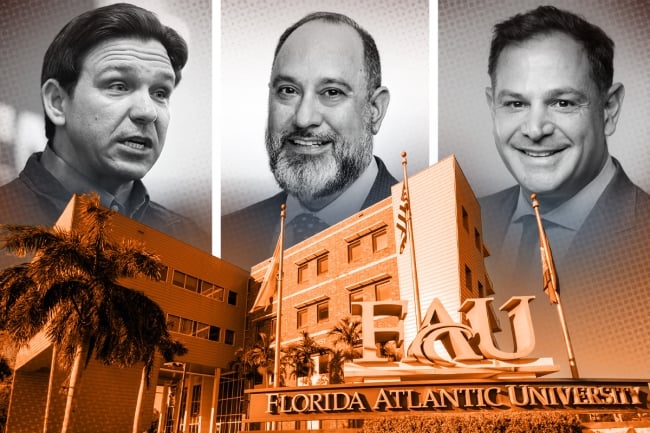You have /5 articles left.
Sign up for a free account or log in.

From left: Ron DeSantis, Ray Rodrigues, Brad Levine.
Photo illustration by Justin Morrison/Inside Higher Ed | Getty Images | State University System of Florida
Thirteen months after it started, Florida Atlantic University’s search for a new president has not yielded a new leader. Now the fallout of the stalled process has prompted the FAU Board of Trustees chair to step down, following withering criticism from state officials.
Launched in January 2023, the search was suspended six months later by state officials. They cited “anomalies” over the search committee’s use of a straw poll to anonymously rank candidates and trim the applicant pool from 60 to 20 before identifying three finalists in early July.
Florida attorney general Ashley Moody determined in November that search committee members broke the state’s Sunshine Law when they anonymously communicated their preferences to the search firm. But others wondered if the failed search had more to do with the board’s rejection of candidate Randy Fine, a conservative lawmaker whom Republican governor Ron DeSantis had reportedly encouraged to apply.
Now FAU’s search for a new president won’t likely be rebooted until the Board of Trustees meets in April, following the release of unspecified guidance expected from the Florida Board of Governors, which recently expressed a vote of no confidence in FAU board chair Brad Levine.
At a board meeting Thursday, Levine stepped down from the position. Trustees then voted to extend interim president Stacy Volnick’s contract for another year amid strong support from students, faculty and community members who spoke up during the public comments portion. Some expressed concern that political infighting has led to the stalled search, with no clear timeline on the horizon.
Procedural Issues or Politics?
Before he stepped down yesterday, Levine had come under fire from the state’s Board of Governors and Ray Rodrigues, chancellor of the State University System of Florida. The chair had defended FAU’s presidential search process, despite clashing with fellow trustee Barbara Feingold, who donated money to Fine and questioned the qualifications of the finalists.
When Levine asked the Board of Governors last month to approve a one-year contract extension for Volnick, members chastised him for failing to provide an employment contract. Levine argued that because Volnick was hired as interim via an appointment letter, no contract existed; FAU instead provided the Board of Governors with a term sheet. But members said the FAU board potentially violated state open meetings laws by approving Volnick’s extension in November without posting the contract online as part of its meeting materials.
“We never received the contract, and it appears that the [FAU] Board of Trustees never received the contract, either,” Rodrigues said at last month’s contentious Board of Governors meeting.
Some board members suggested that it wasn’t possible to extend a contract that didn’t exist in the first place, though the FAU board had approved an extension for Volnick in November. Levine argued that FAU had provided everything the Board of Governors asked for; the board disagreed, and members voted no confidence in Levine as chair. In addition to requesting a formal contract for Volnick, the Board of Governors tasked FAU’s board with curing possible violations of state open meetings laws, which required another FAU board vote to approve Volnick’s extended appointment. The vote passed again Thursday, this time with a contract included in the board agenda in an effort to cure any potential open meetings violation.
Amid the drama, Levine said his decision to step down as chair was best for FAU.
“The university is poised to select a permanent president, a search that has been arduous and now must commence anew,” he said. ”Unfortunately, I have personally become a part of this narrative. The selection of an experienced and visionary leader deserves no such distractions.”
Though the Board of Governors does not have confidence in Levine’s leadership, it appears many in the FAU community do based on the public comments portion of Thursday’s meeting. Various constituents—including donors, faculty, community members and other trustees—thanked and praised Levine when he announced that he would step down.
Levine, who was appointed by former Republican governor Rick Scott in 2018 and reappointed by DeSantis last year, will remain on the board despite surrendering his leadership position.
Questions Linger
While it appears Volnick will remain in place until a permanent president is hired, the timeline for a search is unclear. If the Florida Board of Governors provides guidance on the search, as expected, FAU trustees will likely restart the process at April’s board meeting.
But the timing also depends on when the Board of Governors implements new rules on presidential search processes, as planned. The next meeting when the board could do so is Feb. 21, meaning FAU would either need to call a special meeting after that or wait until April to restart the search.
Should the search resume in April, FAU will need to repeat certain steps, such as developing a presidential profile for candidates and hosting campus visits. If the search is rebooted at the April 16 board meeting and follows a similar timeline as the first go-round, then it could be October—or later—before the board is ready to hire a new president.
Fine’s shadow continues to hang over the troubled proceedings. The former applicant told local media that DeSantis had assured him he would “waltz right in” to the FAU presidency, a job he said he only applied for because the governor’s office asked him to. But he quickly found out that was not the case.
“The community didn’t want me,” Fine told The South Florida Sun-Sentinel in October.
If he had been hired, Fine would have followed in the footsteps of other Republican lawmakers— often DeSantis allies—who have been tapped as college presidents in Florida recently. That list includes former U.S. senator from Nebraska Ben Sasse at the University of Florida, as well as former state lawmakers Richard Corcoran at New College of Florida and Fred Hawkins at South Florida State College. Rodrigues, the system chancellor, is also a former GOP lawmaker.
Other DeSantis allies have narrowly missed out on similar jobs, including the Florida Gulf Coast University presidency, where Henry Mack fell one vote short of being hired.
Despite concerns raised by community members, state officials have dismissed criticism that the FAU search has been marred by political interference connected to DeSantis, who has embarked on a campaign to reshape higher education. Critics say his administration has undermined academic freedom; targeted tenure and diversity, equity and inclusion programs; and engineered a conservative overhaul of New College of Florida.
“There is insufficient evidence to support that the university was directed or pressured to advance or select any specific candidate,” Florida’s inspector general concluded in a December report to the Board of Governors that determined FAU’s search had violated sunshine laws.
But some members of the FAU community aren’t convinced.
Speaking at Thursday’s meeting, FAU communications professor William Trapani expressed support for Levine while also suggesting that other board members have “helped enable public attacks” on senior officials due to “petty personal grudges” and personal support for Fine. While he did not specify which board members, he appeared to be alluding to Feingold.
“In recent meetings, we’ve had board members flagrantly violate presidential search committee [nondisclosure agreements], going in depth on vote counts, disparaging finalists, asserting that they had ethical or legal problems … Not only is that a violation of those NDAs, but it plainly creates liability exposure for the university, and it makes us look amateurish,” Trapani said.
He also questioned why officials have not investigated claims that Fine was promised the job, suggesting that the assurances DeSantis allegedly made could violate state law.
“We’re left wondering, why aren’t we looking into this?” Trapani said.








